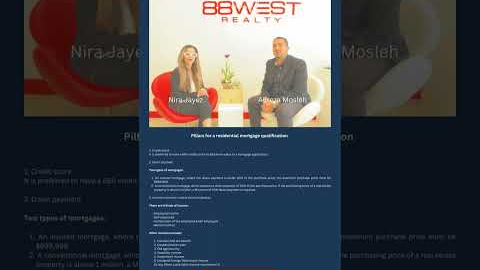Mortgage application need to know facts.
31 View
Share this Video
- Publish Date:
- March 27, 2023
- Category:
- Appreciation Investing
- Video License
- Standard License
- Imported From:
- Youtube
Tags

There are 3 major pillars to qualify for a residential mortgage:
1. Credit score
1. It is preferred to have a 680 credit score to add more value to a mortgage application.
2. Down payment
1. There are 2 types of mortgages,
The 1st one is an insured mortgage, where the down payment is under 20% of the purchase price,
maximum purchase price must be $999,999.
2nd one is conventional mortgage, which requires a down payment of 20% of the purchase price, if the purchasing price of a real estate property is above 1 million, a Minimum of 20% down payment is required
3. Income is the last criteria that is looked at:
1. There are 5 kinds of income:
Employed income
Self-employed
Combination of the employed & self employed
Rental incomes
Other incomes which includes
1. Canada child tax benefit
2. Canada pension plan
3. Old age security
4. Disability income
5. Investment income
6. Declared Foreign Retirement income
Or any Other sustainable income reported on income tax.
There are 3 types of mortgage lenders:
A lender which are the big banks and credit unions
B lenders which are others financial institutions
C or private lenders which are privately held companies who lend mortgages.
Advantages and disadvantages of these lenders?
The A lenders have the most competitive rates & cash incentives
The A lenders do not charge any mortgage fees
C lenders always require additional fees while B lenders vary.
A lenders are the most preferred lenders as they have the most client benefits
It is also important to look at the B & C lenders when the A lender does not approve a mortgage,
as they do approve higher mortgage amounts even when the applicants do not have the preferred credit score & history
or when the subject property is not approved for an A lender appraisal.
@nirajayez
https://beacons.ai/nira.jayez














